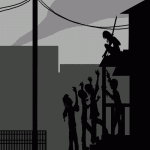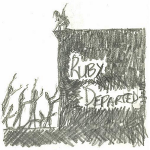FP276 – Mulligan Smith and The Jailhouse Lover, Part 1 of 1
Welcome to Flash Pulp, episode two hundred and seventy-six.
![]() Tonight we present Mulligan Smith and The Jailhouse Lover, Part 1 of 1
Tonight we present Mulligan Smith and The Jailhouse Lover, Part 1 of 1
[audio:http://traffic.libsyn.com/skinner/FlashPulp276.mp3]Download MP3
(RSS / iTunes)
This week’s episodes are brought to you by Dead Kitchen Radio.
Flash Pulp is an experiment in broadcasting fresh pulp stories in the modern age – three to ten minutes of fiction brought to you Monday, Wednesday and Friday evenings.
Tonight, private investigator Mulligan Smith finds himself listening to a tale of prison romance.
Mulligan Smith and The Jailhouse Lover
Written by J.R.D. Skinner
Art and Narration by Opopanax
and Audio produced by Jessica May
“Power windows? Fuck power windows,” Walmart Mike was saying.
The Mercedes-Benz alongside the Tercel pulled away from the stoplight.
Mulligan had offered the old man a ride home after discovering him waiting out the downtown bus in a plexiglas shelter, but he hadn’t expected much in the way of a conversation.
 The greeter asked, “you know those flicks where some a-hole with a moustache finds himself facing off against twenty guys and he just stands behind his jalopy and blasts them all? Yeah, I knew this idiot, Dustin Cameron, who actually tried it. He was on parole, but he couldn’t resist living big. Drove around in a boat of a Cadillac. First car I ever rode in with power windows.
The greeter asked, “you know those flicks where some a-hole with a moustache finds himself facing off against twenty guys and he just stands behind his jalopy and blasts them all? Yeah, I knew this idiot, Dustin Cameron, who actually tried it. He was on parole, but he couldn’t resist living big. Drove around in a boat of a Cadillac. First car I ever rode in with power windows.
“Only because he bought me lunch, you understand – I was done with the life by then.”
Mike paused, drumming his fingers on the passenger-side door’s armrest.
“Few weeks later he rolls on a couple hard-cases who were bothering his employers. Stops his road yacht in the middle of the street, stands up from the driver seat, and levels a Colt .45 – blam, blam, blam.
“I’m guessing that he was coked out of his mind, but they didn’t mention it in the papers.
“Anyhow, one of the pair drops, but the other’s quick, and he gets his own peashooter in play.
“The two of ‘em keep doing the squint and squeeze for a few more seconds, until they’re both clicking at each other, then, full of adrenaline, the idiot gets back in the caddy and starts to drive away.
“Apparently his windshield had several holes in it, and his goddamn engine must’ve looked like a sieve. A block on he realized that his brakes were pooched, and that he couldn’t stop at the light. A FedEx truck moving through the cross traffic hit ‘im in the trunk, though. Spun the car around and made it stall – but the impact was also enough to spark a fire.
“Some pedestrians who hadn’t seen what he’d been running from came pounding the pavement toward him, looking to pull him clear before it was too late, but he jerked out of his shock suddenly, and his first instinct was to bring his big pistol up.
“Well, of course everyone stepped the fuck back.
“He panicked, threw the piece in the rear seat, and started yelling for help. At that point, though, no ones really excited about giving it a second go.
“People could see him slamming at the power windows, but they were as dead as the rest of the car. He tried kicking at the glass, but his sneakers kept bouncing. By the time he thought to look for the Colt, the Cadillac was so full of smoke he probably couldn’t see where he’d dropped it – he cooked before he found it.”
Mulligan whistled. There was a note of emotion in his passenger’s telling that seemed heavier than the story – one more tale of violence in the hundred he’d heard previously – so, rather than trample a carefully prepared runway, the private investigator otherwise maintained his silence.
After a moment, Mike cleared his throat.
“It’s funny, in prison people hustle hard for just a bit of sugar,” he said. “That’s where I met Dustin. There was this guy, real prison house Cyrano, you know, used to write letters for him. Well, really, the guy did it for a lot of folks. Some illiterate liquor store holdup man would wander off to him in the yard and say “Hey, it’s me and my lady’s third anniversary, can I get a poem?” The writer’d ask a few questions – you know, get a feel for what their relationship was like – and then he’d wander off and scrawl a little something.
“In exchange, Cyrano would score a couple of packages of Twinkies from the canteen. Kept him fat through the cold months.
“Hell, he was no Shakespeare, but a lot of those guys barely knew how to read.
“Dustin and him got in pretty good. Came to the point where Cameron would just bring his words from home over to Cyrano’s bunk to have ‘em read, then the ghostwriter would spit something out and collect his sweets.
“Thing is, after a few months, the scribbler falls for the girl. Can’t blame him, really – he had no one writing him, and she was always hella enthusiastic about his messages.
“I was always under the impression that maybe it was as close to a romance as Dustin ever gave her, even if it was a sham.
“There’s a limit to what you can say, you know – what they’ll let pass through the mail – but things got as hot as they could under the warden’s watchful letter opener.
“Maybe that’s why Cameron stopped wanting to write as often, and waited before swinging by Cyrano’s bunk. The correspondence, and Twinkies, slowed to a trickle.
“Now, Dustin was to be in for twenty. Didn’t happen that way – he did just over six before he was released to go down in his blaze of glory – but, as far as we knew, he was in for a full shift.
“Cyrano, however, was short, and he couldn’t shut the woman from his mind, even if he’d only seen her in a grainy picture taped to Dustin’s wall.
“Two months before he’s to be pushed out the gate, Cameron started a major ruckus in the yard and got himself shoved in the hole for a little thinking time.
“He was still there when lover-boy went through the door.
“My understanding is that, while Cyrano wasn’t proud of it, he looked in on Mrs. Cameron not long after. Guess he’d written her address enough times to have it memorized.
“It was a small apartment on the west side of the city – he caught her exiting her door, dolled to the hilt and glowing like a classy pinup. She was pulling a gent along behind her, and the both of them were grinning as if they were kids sneaking out from under the bleachers.
“Dustin had a temper, so I suppose she can’t be blamed for not being in a hurry to piss him off by delivering the news that they were done. She did theoretically have a couple decades.”
“Right, well, Cyrano just apologized and said he’d meant stop on the floor above – said he must have hit the wrong button in the elevator, can you believe that, ha, ha, ha. Then he ran like a kicked dog.
“Haven’t seen him in quite a while, actually.”
Years of practice had guided the pacing of Mike’s telling, and, as he finished, Mulligan was nosing his ancient Tercel into the parking lot of the ex-con’s residence.
“What do I owe ya?” asked the elder man, still wearing his blue work-smock.
Smith smiled. “Nothing, as always – though, honestly, I now have a terrible hankering for a Twinkie.”
Mike scowled, but found he couldn’t hold it, and was forced to shift to a red-cheeked grin.
“C’mon inside,” he said, “I happen to have a few in the fridge.”
Flash Pulp is presented by http://skinner.fm, and is released under the Canadian Creative Commons Attribution-Noncommercial 2.5 License.
Freesound.org credits:
Text and audio commentaries can be sent to comments@flashpulp.com – but be aware that it may appear in the FlashCast.
– and thanks to you, for reading. If you enjoyed the story, tell your friends.
 It was a Sunday, and Mulligan was dabbing at his plate’s last smudge of Hollandaise sauce with his final sliver of English muffin.
It was a Sunday, and Mulligan was dabbing at his plate’s last smudge of Hollandaise sauce with his final sliver of English muffin.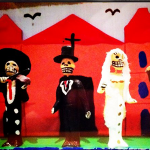 The grass was ankle deep, and dotted with weeds and wild plants, but the trees were meticulously shaved, creating a field of ornate posts holding aloft a thick canopy of green. Cropped maples, bare of foliage for the lowest twenty feet, stood as support to the thick-trunked sequoias that dominated the view. Faces, scenes, and ornate patterns, had been carved into the surface of the lumber, lending the space the feeling of a naturally grown temple.
The grass was ankle deep, and dotted with weeds and wild plants, but the trees were meticulously shaved, creating a field of ornate posts holding aloft a thick canopy of green. Cropped maples, bare of foliage for the lowest twenty feet, stood as support to the thick-trunked sequoias that dominated the view. Faces, scenes, and ornate patterns, had been carved into the surface of the lumber, lending the space the feeling of a naturally grown temple.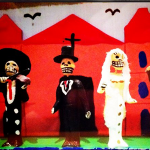 Across the motel lobby’s sitting area was a freshly showered man whose black suit stood sharply against the wallpaper’s pastel floral pattern. His cologne was far reaching, and there was a laptop bag at his feet, so she guessed he was likely staying on business. He was rifling the breakfast buffet’s selection of muffins, hoping, Bunny thought, for any that might contain chocolate chips.
Across the motel lobby’s sitting area was a freshly showered man whose black suit stood sharply against the wallpaper’s pastel floral pattern. His cologne was far reaching, and there was a laptop bag at his feet, so she guessed he was likely staying on business. He was rifling the breakfast buffet’s selection of muffins, hoping, Bunny thought, for any that might contain chocolate chips.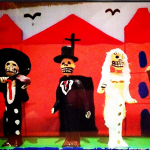 There’d been some question as to her heart’s preference, but the concern in her round eyes was clearly intended for the Chevelle. Within, Dylan had made an attempt to pull onto the soft shoulder, but his delayed reaction came too late.
There’d been some question as to her heart’s preference, but the concern in her round eyes was clearly intended for the Chevelle. Within, Dylan had made an attempt to pull onto the soft shoulder, but his delayed reaction came too late. The grass was thick, and the sun was bright. It was rare for the private investigator, who spent so much of his time wandering Capital City’s concrete, to encounter such an plush expanse of green, and Mulligan was fighting the urge to take off his shoes.
The grass was thick, and the sun was bright. It was rare for the private investigator, who spent so much of his time wandering Capital City’s concrete, to encounter such an plush expanse of green, and Mulligan was fighting the urge to take off his shoes.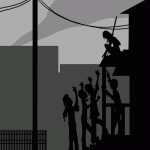 The party was a quiet affair, just her son, his new fiancee, her parents, and a few friends from town. They’d all parked along the double-rutted lane before entering the yard of her home – one of the last to be able to claim to be truly rural in New York state – and were now seated in the plastic white lawn-chairs she’d scattered around the fire pit.
The party was a quiet affair, just her son, his new fiancee, her parents, and a few friends from town. They’d all parked along the double-rutted lane before entering the yard of her home – one of the last to be able to claim to be truly rural in New York state – and were now seated in the plastic white lawn-chairs she’d scattered around the fire pit.